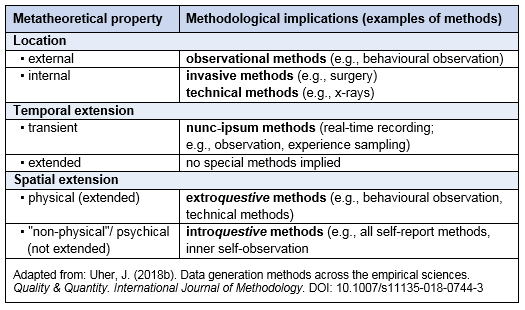Transdisciplinary Research on Individuals
Transdisciplinary
Philosophy-of-Science (TPS) Paradigm
Transdisciplinary Philosophy-of-Science Paradigm for Research on Individuals (TPS Paradigm)
- Methodological framework -
- Classes of data generation methods
- Introquestion versus extroquestion - Overcoming limitations of concepts of introspection
- Methodological approaches to taxonomise individual differences
Classes of data generation methods: Phenomenon-method matching
|
The three metatheoretical properties determining perceptibility by humans are used to derive elementary methodological concepts and to define classes of methods that are therefore far more basic than those commonly considered (Uher, 2019).
|
Introquestion versus extroquestion - Overcoming limitations of concepts of introspection
|
The unique properties of the psyche are used in the TPS-Paradigm to distinguish methods enabling access to psychical phenomena from those that cannot. Therefore, the novel concepts of introquestion and extroquestion (derived from the Latin quaerere for to seek, enquire) are introduced. They are defined and differentiated from one another on the basis of:
These concepts differ in essential ways from previous concepts of introspection and extrospection, which do not allow to make such differentiations because they build on a methodical flaw (for details, see Uher, 2016b, 2019). |
More information available in Publications and Science Blogs.
© 2013-2026


